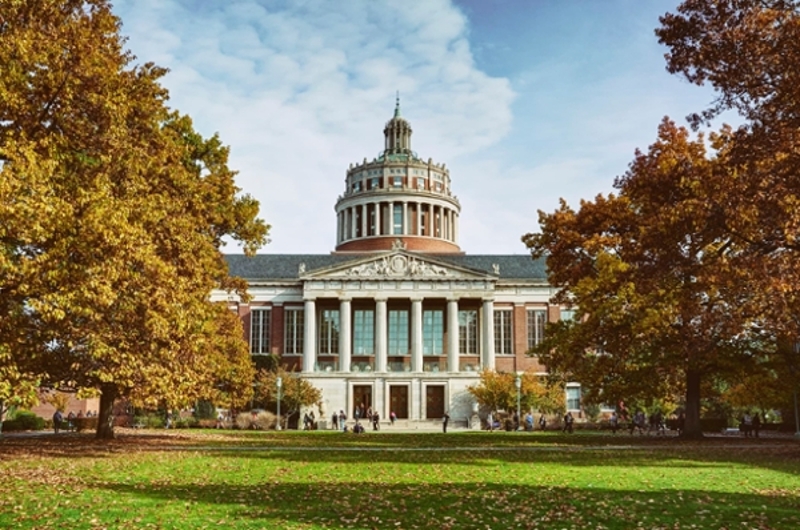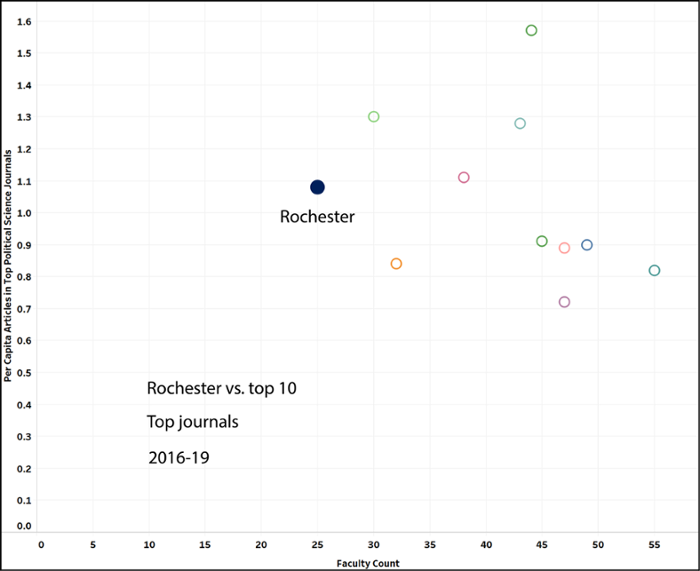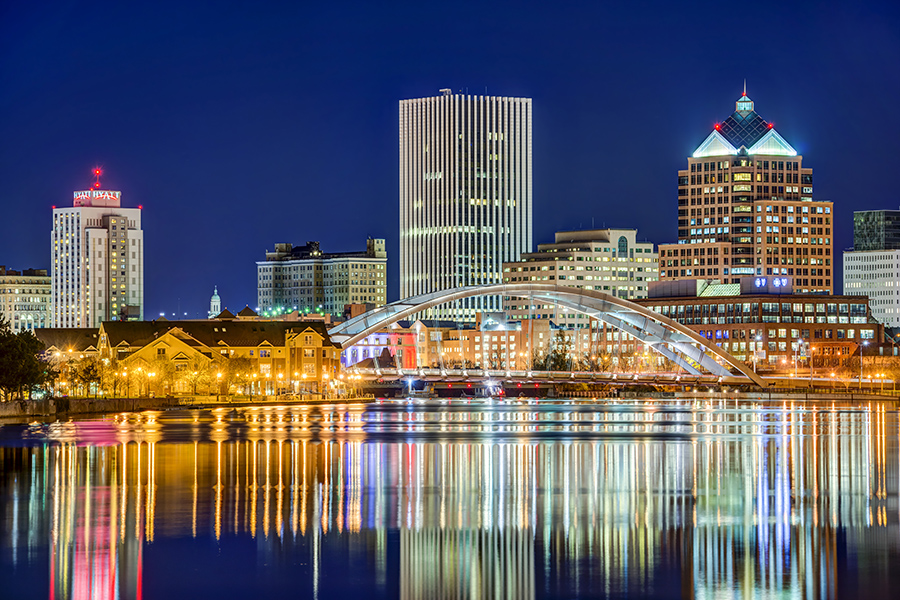Prospective Students
Why Come to Rochester?
Rochester approach: At Rochester, we’re committed to the rigorous analysis of substantive questions in politics. Our faculty and PhD students apply advanced formal and statistical methods to study substantive problems of democratic accountability, civil conflict, political parties, voting rights, authoritarian politics, and more.

PhD curriculum: All students take sequences in formal modeling and statistical methods in the first year of study, giving them a foundation and allowing them to go deeply into advanced seminars. Students learn methodological tools in their technical courses (PSCI 404, 405, 407, 408); they learn how to identify and solve interesting problems in our substantive courses; and they learn how to convert results into publishable papers in the graduate research seminar, PSCI 576. Our website contains a listing of courses with detailed descriptions.
Common language: Our faculty and graduate students use a range of methods, from qualitative analysis to sophisticated techniques in game theory, maximum likelihood estimation, and structural modeling. But we are on the same page as to what constitutes good research, and all faculty and grad students share a common language. At Rochester, an applied comparative political scientist can talk to a pure formal theorist, who can talk to someone doing experiments in American politics. This expands your effective set of colleagues and promotes cross fertilization of ideas.

Training by faculty by who regularly produce advanced research on applied problems in political science: The figure to the right shows how Rochester stacks up compared to the US News top 10 political science departments, using per capita publications in a set of top journals as our metric. In the figure, the x-axis is the size of the department (we’re small!), and the y-axis represents faculty productivity. The graphic shows that despite its small size, Rochester competes with the very best departments, and that our PhD students receive training and advising from faculty who are pushing the frontiers of their fields – and who have the record of research productivity to show for it. The Department website provides a list of selected faculty publications, with article titles and placements.
Collegiality: As the figure shows, Rochester is small. It’s also a collegial place: PhD students are on a first-name basis with faculty; they share office space in the same building as faculty; and it’s common for faculty to coauthor with students. These relationships often become long-lasting partnerships, with many collaborations lasting long after students receive their degrees and start their academic careers.
Student publishing: Along with giving students the tools and substantive knowledge to do good research, a main focus of the program is to get our PhD students publishing by the time they enter the job market. The PhD program is designed to train students how to write, submit, and publish their work. Financial support from the Lanni fund is available for PhD students to work as research assistants to faculty over the summer; most of our students take advantage of this opportunity, and it often leads to coauthored work between faculty and graduate students.
Cutting edge training in formal and statistical methods: Students who want to specialize in theory and methods will be hard pressed to find a better program than Rochester. We are ranked among the US News top 10 departments in the area of political methodology, but Rochester is a distinct alternative: compared to the other top programs in political methodology, we emphasize the importance of mechanisms, and the role of formal modeling and statistical analysis in isolating and studying those mechanisms. In this respect, our PhD program takes a back seat to no other in political science. Owing to the technical nature of our program, PhD students become eligible for a STEM-designated MA upon passing the PhD qualifying exam. This designation not only reflects the program’s rigor but also allows international students on F-1 visas who earn the MA to qualify for a 24-month extension of Optional Practical Training (OPT), provided they meet federal requirements.
Placement: Rochester has a long tradition of successful placement at political science departments, and even business schools and policy schools. The Rochester PhD is a trademark, and training at Rochester gives students credibility and the potential to land at the top departments in the discipline. In fact, many of the departments we commonly compete with have at least one Rochester PhD among their faculty ranks, including Duke, Emory, NYU, Princeton, Rice, Texas A&M, Vanderbilt, and Wash U.
Wallis Conference on Political Economy: The annual Wallis Conference has been a fixture in the political economy landscape for decades: we held the 25th anniversary conference in 2018, and the conference continues to go strong. This is a special event that brings about 45 economists and political scientists to Rochester for a two-day conference, where the latest work is presented by a mix of senior leaders and young, productive scholars. The Wallis website contains an archive of past programs, which feature a mix of theoretical and empirical work in the broad area of political economy. All of our graduate students are invited to attend, and the opportunity to see the presented papers and interact with the assembled researchers is a tremendous comparative advantage of Rochester.
Related centers and institutes: Our PhD students can benefit from resources, training, and events underwritten by the Democracy Center, the Wallis Institute of Political Economy, the Watson Center for Conflict and Cooperation, the Skalny Center for Polish and Central European Studies, the Goergen Institute for Data Science and Artificial Intelligence, and the Frederick Douglass Institute and Department of Black Studies. Check out the websites of these centers and institutes for more information.
Rochester Stylized Facts

Rochester in a nutshell: Rochester is a diverse city of just over 200,000, with a metro area population of 1.1 million. It offers a host of cultural amenities, including an active music scene and the university's own Eastman School of Music, a vibrant food and restaurant landscape (including a burgeoning brewery culture), and a wide range of theatrical, museum, and festival experiences throughout the year. With easy access to the beautiful Finger Lakes region, living in Rochester combines many of the best features of urban and rural living.
Weather: With Rochester weather, you know what you’re going to get. Yes, we have winters, but we have three other seasons, which are not widely recognized. In fact, our weather is very stable, as we don’t often get severe storms from the Midwest, and we usually don’t feel storm fronts coming off the Atlantic.

- Winter: We get a good helping of snow, so you will need a coat, hat, and gloves for the winter months. On the other hand, it doesn't slow us down, because Rochester has the infrastructure to deal with winter weather, so a few inches of snow doesn't faze us, unlike some other cities. Every few years, there’s a big snowstorm, but it’s a pause, not a crisis: roads are cleared and salted within a day, and we get back to work. Full disclosure: some people may think the winters last a little too long; we won’t take a position on this, but we’ll point out that others admire the aesthetics of the season, and enjoy outdoor activities like downhill skiing at Bristol Mountain, cross country skiing at Mendon Ponds Park, or ice skating in Martin Luther King Jr. Memorial Park.
- Spring: On the other hand, spring is short, but nice. It’s greeted by the annual Lilac Festival at Highland Park, and festivals in the area continue throughout the spring and summer. Check out the Clothesline Festival and the Park Ave. Festival, for a sampling.
- Summer: Summer is a wonderful season in Rochester, and a well-kept secret. We get plenty of sunny days (with a few thunder showers mixed in), but without the humidity experienced on the coast, and without the intensity of southern locations. You won’t feel the need to retreat to air-conditioned structures to escape the heat, so you could take a cruise on the Erie Canal, for example. That said, we do recommend 50 SPF (or higher) sunscreen!
- Fall: Fall is beautiful, and not just because that’s when the annual Wallis Conference on Political Economy is held. Rochester offers a striking change of colors, especially if you drive a few minutes outside the city. The Finger Lakes and (a bit further) Letchworth State Park are excellent vantage points to view the fall foliage and other natural scenery.
Finger Lakes: Did we mention the Finger Lakes? This is a beautiful area south/east of Rochester that features natural surroundings with hiking, water activities, and a noteworthy wine region.
Cultural life: The Rochester area is small and known for its good schools and family-friendly environment, but there’s also a cultural scene featuring art, music, and cinema. Check out ArtisanWorks, the Neighborhood of the Arts, the annual Rochester International Jazz Festival, the Rochester Fringe Festival, and the Little Theatre and Dryden Theatre, to get an idea. Most graduate students live in the South Wedge or Park Avenue neighborhoods, which are just minutes from campus and these amenities.
Cost of living: Obviously, Rochester is not as expensive as large, metropolitan areas, but you might not realize how big the contrast is. As of spring, 2021, according to NerdWallet, the cost of living in Manhattan is 2.6 times higher than in Rochester: for example, pre-tax income of $71,000 is equivalent to $27,000 in Rochester. Compared to San Francisco, it’s a little closer: pre-tax income of $55,000 is equivalent to $27,000 in Rochester. And compared to Boston, it's a little closer yet: pre-tax income of $42,000 is equivalent to $27,000 in Rochester.
Livability: Rochester is a livable city, and was recently ranked among the top 25 places to live by US News (placing #2 in New York State, by the way). If you like to eat and drink, Rochester has a lot to offer: we were recently named a top "foodie city"; the area supports many farmer's markets, including the Rochester Public Market, which was voted best in the US in 2010; the "Super" Wegmans in Pittsford is a one-of-a-kind experience for the most discerning shoppers; and if you want to go out after you're done eating, Rochester has plenty of options for breweries and cocktails (we suggest moderation, since you'll be taking classes or working on your research!). And if you need a break or have visitors, there are plenty of things to do in the area, including performing arts, museums and activities, and local sports (including the famous Oak Hill and Locust Hill golf courses). Finally, if you need a change of scenery or have to pick up those visitors, the Frederick Douglass Greater Rochester International Airport is small, easily navigable, and literally five minutes from campus.
Parting Thoughts
You get the idea: Rochester is an easy place to live, and that means it’s easier for you to focus on your graduate training and to realize your potential as a political scientist. We encourage all prospective PhD students to factor in academics and personal considerations to choose the best program for them; that decision depends on your preferences and goals, and so the right choice is a subjective one. But we advise all students to take an appropriately farsighted perspective on your choice of graduate program, because your decision now will determine a major investment in (and thus the long-run trajectory of) your academic career.
Best of luck with your decision!
